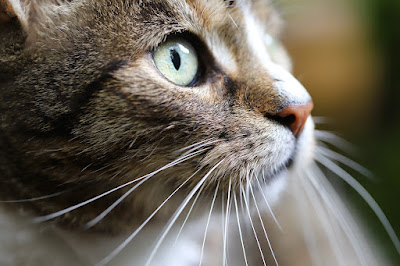Cats show their emotions through their eyes, using pupil size and eyelid position to show their feelings. They will communicate with you if they are afraid, happy, excited or aggressive. Here's how to decipher what they are feeling:
.
Wide Open
Alert, wide-open eyes signal trust. In friendly greetings, pupils are at normal dilation. The eyelids may be squinty, brows are soft, and the cat may offer cheek rubs. Accept this as a sign of love and trust.
Unblinking Stare
When a cat starts to show interest, the eyes look more directly with an unblinking stare at the object, person, or animal of interest, and the pupils dilate slightly. The general message is “I know you’re there and I don’t want a fight.” But the unblinking stare is also a communication megaphone for wanna-be aggressive cats to adversaries. This is an important control message in multi-cat households with limited resources such as food, water, litter box, toys, and territory. People often miss the cue because of the subtlety.
Direct Stare
A direct stare in cat language is threatening and confrontational. An offensively aggressive cat’s pupils may be slits or dilated. Squinty eyelids protect the eyes from potential injury. In defensive aggression, pupils are dilated and the brow furrowed. Avoid interacting with this cat. If you’re not familiar with a particular cat, avoid risk of injury by not making direct eye contact.
Pain
When a cat is experiencing body pain, its pupils are dilated. Squinting also indicates pain in the body or eye. Bloodshot eyes may also signal pain.
Slow Eye Blinks
This is the best look to get from your cat. Slow eye blinks express love and trust. The eyes, lids partially closed, have a sleepy, dreamy appearance. If you get a blink like this, do one right back to show you love them too.
Look at this:
You can follow me on: Facebook, Twitter, Instagram, and Pinterest.


























